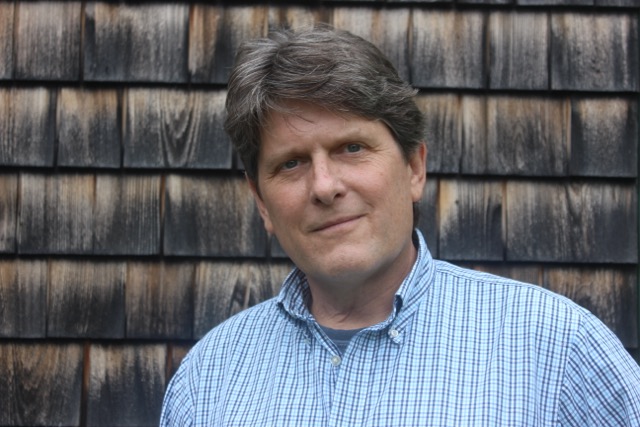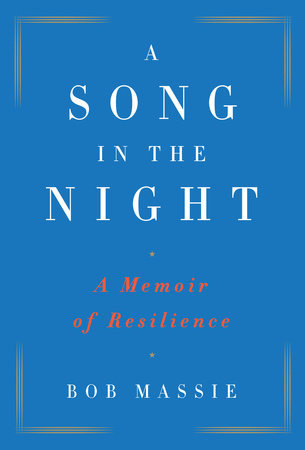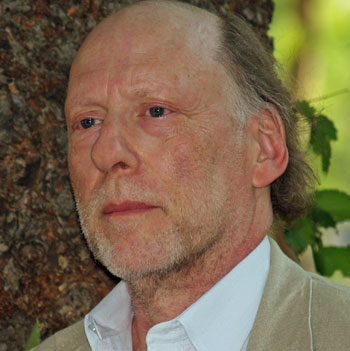The first time I heard Bob Massie’s forceful voice, it rang out unceremoniously, filling the vast, lustrous, quasi-ecclesiastical dark-wood space of Sanders Theater, the university’s largest venue, which occupies Memorial Hall, the Gothic pile built just after the Civil War to honor the 136 Harvard men who died in that grave and necessary war.

Bob Massie (Photo courtesy of bobmassie2018.com)
Massie was standing up in front of the stage, facing an audience of 1,200 or so alumni squeezed together in Sanders Theater, though not to hear him. They were there to hear the woman on the stage: Drew Faust, the president of the university. With three other activists, Massie was holding a sign that read HARVARD ALUMNI FOR DIVESTMENT. It was May of 2014, and President Faust had been steadfastly stalling the Divest Harvard student group that had been campaigning to sell shares of fossil-fuel corporations from the Harvard endowment, which then amounted to some $37.6 billion, which if Harvard were a nation would rank it alongside Serbia, around 95th in the world.
Massie’s voice was arresting: “I am the Rev. Robert Massie. Harvard must now stop taking cash from fossil fuel companies committed to the destruction of the Earth.” This was not the first time he had declared out loud that investment was a moral decision as well as a financial one. Massie is an ordained Episcopal minister, and he has the imposing pipes to show it. Indeed, he may have raised the ghosts of Ralph Waldo Emerson, Henry David Thoreau, Wendell Phillips and other illustrious Harvard abolitionists of the 19th century from their graves not far away.
The university escorted Massie and his colleagues out of the auditorium. Later they were informed that they were no longer welcome in Harvard buildings. It is not clear whether this banishment still applies, or whether, having announced his candidacy for the Democratic gubernatorial nomination in Massachusetts this week, Massie will still be banned. A starchy censoriousness still reigns over America’s most illustrious institution of higher learning, where even after the great financial collapse of 2007-08, some 31 percent of 2014 graduates took Wall Street jobs and 70 percent took the trouble to supply resumes to Wall Street and consultant companies.
The gods of mirth who overlook Cambridge, Massachusetts, from their empyrean heights no doubt relish the fact that Massie holds an unusual set of Harvard credentials. He received a doctorate in business administration from Harvard in 1989, then become a lecturer at the Divinity School, a position he held till 1996. He is also the author of the lucid, definitive and sophisticated history of the American movement against economic support of South African apartheid, Loosing the Bonds: The United States and South Africa in the Apartheid Years. He has not just arrived at an understanding that money talks.
After the South Africa campaigns of the 1980s, he spent years mobilizing green thinking to regear institutional investment in the direction of renewable energy. He’s not an anti-business crusader; he’s a hands-on reformer. For seven years, he served as the executive director of Ceres, the largest coalition of environmental groups and institutional investors in the United States. In 1998, he co-founded the Global Reporting Initiative, which generates trusted standards for sustainability reporting, enabling organizations to measure and understand their most critical impacts on the environment, society and the economy. The happy result is that more than 2,000 corporations and institutional investor groups now take part in the corporate disclosure standards he pioneered.

A Song in the Night by Bob Massie. (Image courtesy of Penguin/Random House)
He did this while struggling — successfully — with a cascade of illness that would have daunted Job. Born with hemophilia, he contracted HIV from contaminated blood, only to discover — what a stroke of good genetic luck — that a mutation had prevented him from developing AIDS. Eventually, he developed hepatitis C and cirrhosis of the liver from blood medicines. After years on a waiting list, he received a successful liver transplant which cured him, once and for all, not only of the cirrhosis and the hepatitis C but of the hemophilia that had launched his travails. He chronicles not only his illnesses but his courage in an extraordinary 2012 memoir, A Song in the Night: A Memoir of Resilience. I am not one who is easily moved by stirring memoirs but this one moved me deeply.
I was already a bit familiar with Bob Massie, though at a remove, since the Divest Harvard alumni trying to talk sense to the university’s haughty managers about the atmospheric catastrophe underway was mainly a group that existed online. He is one of those remarkable activists who crosses with some ease between the outsider domain and the insider domain. He’s a movement guy and he’s a pro — a Transcendentalist in politician’s clothing. This is no easy boundary to cross, so it’s no wonder it’s a rare blend. In decades of political life I have encountered no more than a handful of movers and shakers possessed of the presence of mind, the acumen, the principle and the adroitness and gregariousness all combined — neat trick! — to make presentable showings in the unforgiving world of electoral politics where, in the end, when the votes are counted all the excuses are left in the dust. Massie is one of this small circle. He does not take his eyes off the prize but he is out to win. He is a moralist but he knows, as W.H. Auden did, that
History to the defeated
May say Alas but cannot help nor pardon.
Massie has now declared for the Democratic nomination for governor. The incumbent, Charlie Baker, elected narrowly in 2014, is one of the small band of Republicans who — in the current locution — affects to “distance” himself from the titular leader of his party, meaning that he touts bipartisanship as if that were a policy addressing people’s problems. He tiptoes into the realm of complaint on this or that issue where he disagrees with Trump, but cannot address the state of emergency that grips the country, including the Commonwealth of Massachusetts.
Ringingly, Massie begins the gubernatorial announcement that appears on his website with supreme, and requisite, urgency. “I am running for governor because we live on the precipice of history.” You do not expect to read such exalted words in a politician’s announcement, but they’re up to the job — they underscore what’s at stake in politics now. No one will accuse Massie of thinking too small, though he knows that big changes are made of small ones that point in the same direction. Massie is not afraid of rhetoric, a lovely word for a necessary dimension of politics, without which citizens are not called to reach beyond short-term interests. But he does not trot out eloquence in order to dart away from the state’s practical needs. He is a visionary with his feet on the ground.
— Bob Massie
Massie wants to awaken the better angels of our collective nature, but he does not take shelter behind the crepe-paper curtain of bipartisanship. He knows the patriotic good has real enemies. He wants to nationalize the election, to give people who are appalled by Donald Trump someplace to stand, and to do so he is unabashed about using the language of the sacred. “What kind of world do we live in,” he asks, “when we have to defend the very concept of truth, of fairness, of generosity, of dignity, of equality and of inclusion? These ideas, all of which are sacred to our democracy, all of which we have often betrayed but never abandoned, are being trashed by the most dangerous president in our history.”
Announcing his candidacy in Somerville on May 16, Massie spoke straightforwardly of “the democratic principles of fairness, of equality, of inclusion and of liberty and justice for all” — principles that “today are under brutal attack by a president who swore to preserve, protect and defend the Constitution, but almost certainly has never read it.”
He is equally unabashed to speak with high emotion:
Even as we feel fury and grief about how many of us in this country, how many innocent people around the world, how much the planet itself will suffer we need to look through the smoke and the wreckage to see that we have also been given a chance to remake our politics and our economy in fundamental ways.
And to speak about rights, citing Franklin D. Roosevelt’s 1944 State of the Union address to the effect that “true individual freedom cannot exist without economic security and independence.”
Massie’s idea of rights is wedded to his diagnosis of three structural problems: inequality; the cost of energy and climate change; and the threat to democracy posed by money dominance, billionaire rule and disenfranchisement. As for inequality, it doesn’t just happen. It was made to happen. “Over the last 30 years,” he said in announcing, “big corporations, big banks, big hedge funds and others have abused the idea of responsibility to shareholders to justify attacks on labor, violations of human rights, predatory marketing, monopoly pricing and the active destruction of the only climate and the only planet.”
His green agenda is an environmental justice agenda. Thus this on the immense irresponsibility of the plutocracy that dominates Massachusetts:
If you ever wonder just how disconnected the elites of this state are from the grim truth bearing down upon us, just think about the Seaport district in Boston. Because somehow architects designed, city officials approved, banks financed and insurance companies have insured 10 million square feet of new construction — costing more than $2 billion.
And all this new construction sits in the single most likely to flood district in all of Boston. And when the waters start rising, the people who made those mistakes are going to ask for compensation from the state — once again leaving low-income communities stranded.
Massie’s agenda is well-tailored to Massachusetts, as to other states especially on the two coasts and in the most urbanized states. He declares that “Massachusetts could be ‘the Saudi Arabia’ of wind, the center of the offshore wind industry in the US — with manufacturing facilities, with a highly trained workforce, with super modern port to support the ships going out to install the windmills.”
Visionary or practical?
In this bleak time, if there is to be more than resistance to the worst depredations of the plutocratic nightmare that has risen to power, an activist agenda has to make significant room for statewide politics that creates, cultivates and rewards majorities. It is there that the bulwark against Trump and his desperado party has to be built and fortified.
Massie is no stranger to electoral politics, and some insiders think he is too ready to run. In 1994, he ran for lieutenant governor of Massachusetts and lost. In 2011, he was in the race to oppose Scott Brown for the Senate seat when Elizabeth Warren announced; seeing his funding dry up, Massie bowed out then. But that was in a troubled America, a plutocracy in the making. Now the plutocracy has arrived, and strives to implant itself for a generation. Massie is 60 years old — old enough to have weathered much and thought deeply, young enough to have a future in politics. He may just succeed in putting a new face on idealism — the new practicality.




